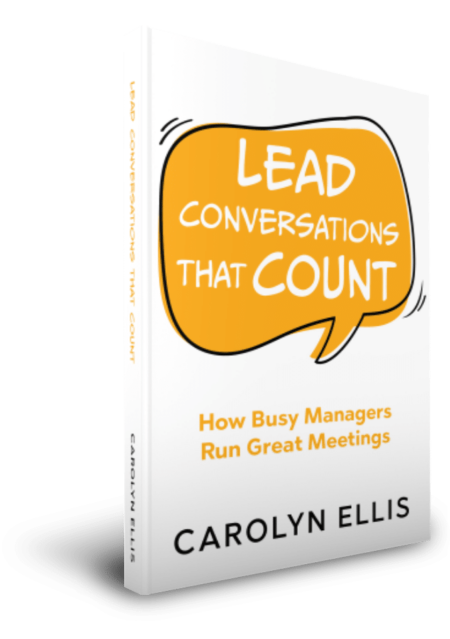Have you ever said something to someone and it sounded really good in your head, but you actually said the words out loud your delivery was a bit rough, or off-putting? I think we’ve all had experience of reading someone’s text message and read a lot of energy and unintended meaning into it simply because they forgot to turn the caps lock off. If you find there’s a big gap between your intention and your impact, I hope you’ll tune into this week’s video “Calibrate Yourself”.
Seriously, investing 5 minutes learning the 3 tips I share in this video will save you a lot of scrambling and damage control! I find people’s weariness with the long-term nature of the pandemic has worn people’s patience quite thin, so they can really help.
TRANSCRIPT OF VIDEO
Hi, everyone. It’s Carolyn Ellis from BrillianceMastery.com. Thank you so much for joining me for this short video, which is part of my series Lead Conversations That Count where I’m sharing tips and strategies from my latest book, Lead Conversations That Count How Busy Managers Run Great Meetings.
Today’s tip is one of my favorites: Calibrate. And calibrate is actually the first of a five-part COUNT roadmap model that I use in the book to help leaders be prepared to be present, effective, flexible, adaptable, and inspiring to their teams as they lead conversations and meetings. Calibrate is about taking a moment before you even begin that meeting to really tune in and see how are you doing before you get into the room. I love this quote from Bill O’Brien. He says that, “The success of an intervention depends on the interior condition of the intervener.” Thank you, Bill. O’Brien. Because here’s the thing. If we have a lot of negative self-talk going on, or if we have a state of anxiety running through our mental and emotional systems ,that gets transmitted in how you interact with people in your meeting. It’s really important that we do our work. “What do I need to take care of so that I am in peak performance mode when I start that next session with my group?”
I remember when I was in high school, I used to play the flute, and loved playing the flute. We are always tuning our instruments, not just at the beginning of band practice. Often, if we had a longer rehearsal, we’d have to do another tuning in between. Or if we were performing outside and it was super hot, heat would impact how well we stayed in tune with each other. If you’ve ever heard a young child playing the violin, you know that one instrument being out of tune can throw the whole melody off. What should sound fantastic sounds a little painful. And that’s exactly what happens when we have leaders walking into meetings who are not prepared, who haven’t done the steps to calibrate and bring their best selves to that meeting.
Here are a couple of tips for you.
One, Pause. Put it on your calendar. Don’t just rush off to the next meeting, click the start button and off you go. Just even take a few moments to take a few deep breaths and just say, “Scale of 1 to 10, how ready do I feel right now?” Then just notice maybe you’re feeling a little tense in your neck, maybe there’s a lot of thoughts going on in here. Just taking that moment to stop, pause, breathe, scan is so important because that helps you get in tune with where you’re at. What kind of note are you likely to be playing?
Second tip, Name it to Tame it. What I mean by that is if you do notice there’s something that feels a bit discordant or uncomfortable, or it’s causing you some state of questioning, write it down. Name it. Say it out loud. What we’re trying to do here is take those thoughts that kind of turn around in our already overloaded cognitive bandwidth and put them outside ourselves, so we get some perspective on what the thing is. When you write it down you say, “Oh, you know what, that’s an issue. I can park it. It’s not going to affect me now that I can see what that is.” Put it to the side. Maybe you need to do something. Maybe you need to have a phone call with somebody to resolve some sort of loop that needs to be closed so that you can be fully present in your discussion.
The third tip I want to share with you is Use it. We are pretty amazing mechanisms of nature, aren’t we? Intelligence isn’t just up here above the neck. We use our whole body and notice what’s going on. So if your gut is feeling like you got a bit of a pit in there, it might be telling you something. It might be picking up a signal, and not necessarily that it has anything to do with your leadership capability. It might be picking up some anxiety, perhaps from your team or some lack of clarity about this next undertaking that you are having a meeting about.
If you’re noticing some of these things, don’t just discard it, get curious about it. Maybe you want to bring it to your team and say, “Listen, as I was preparing for a meeting, I noticed I had a bit of a pit in my stomach. I’m wondering, are we all really committed to this path or are there some angles that we haven’t looked at fully yet?” Bring that in, adapt that mindset of curiosity. See what you discover from all of that. When you are calibrated, it really gives you a much better chance to make sure that your intention and the impact that your words and your demeanor has with people are in perfect alignment.
I hope that’s helpful for you. If you have any questions, just shoot me an email or send a comment down below. If you think that you might like to have some additional support or would like more information for you and your team and your organization, feel free to reach out to me as well.
Thanks so much. And we’ll see you soon.




